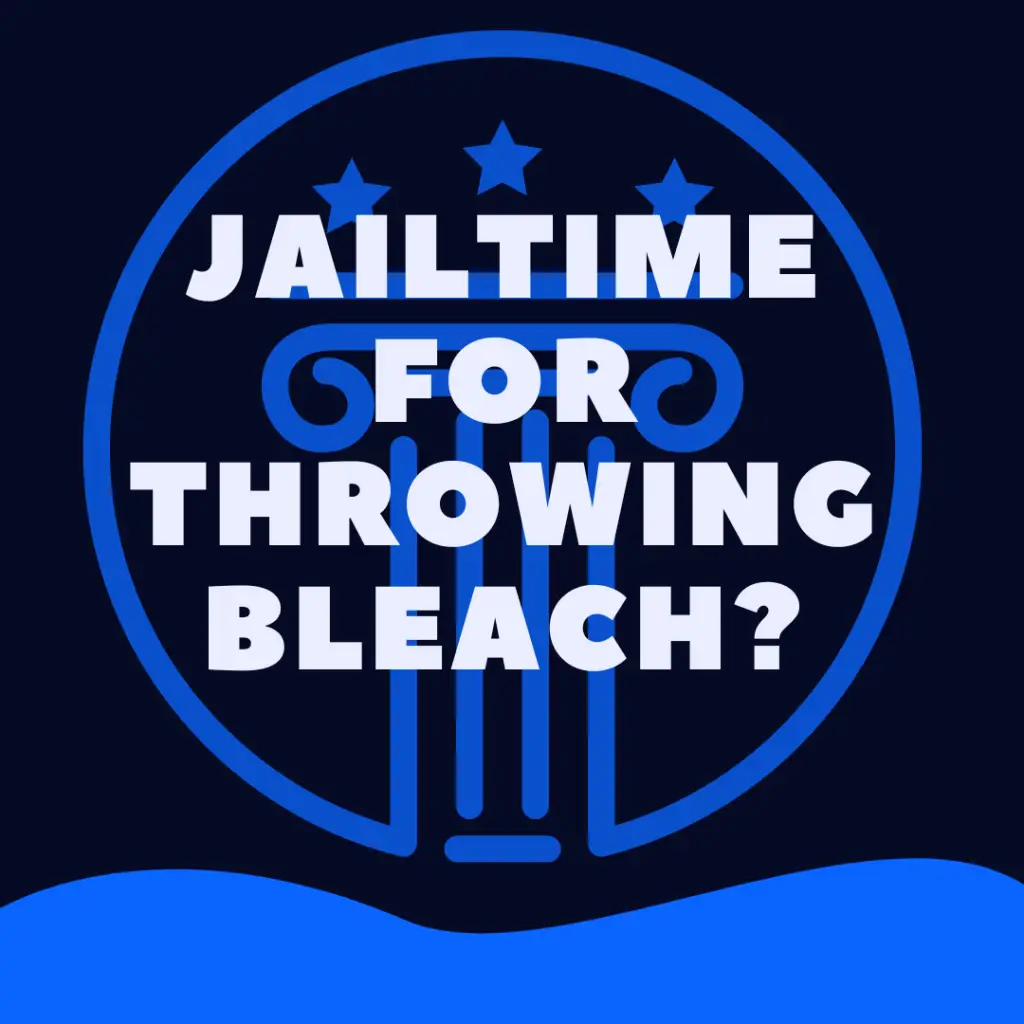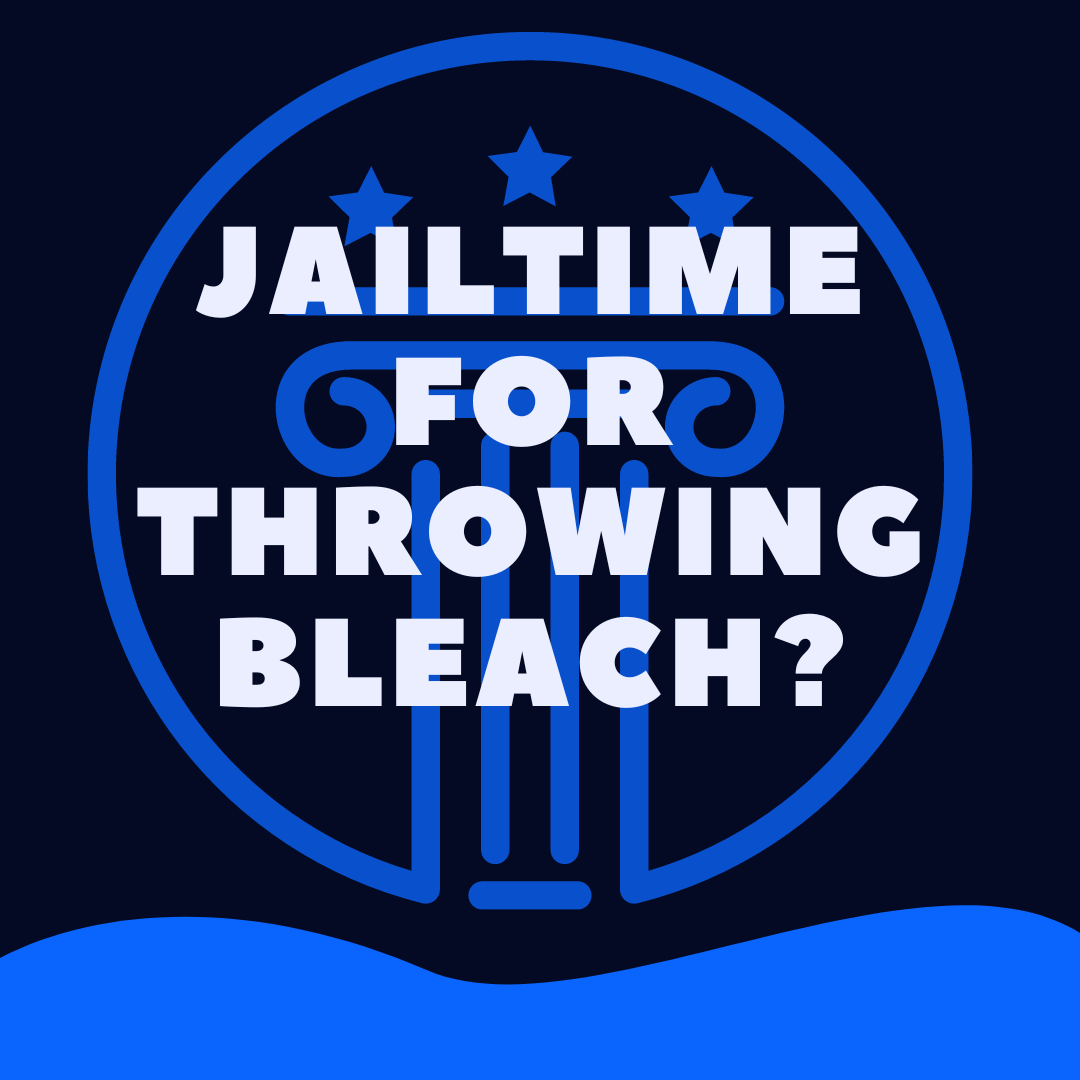Yes, you can go to jail for throwing bleach on someone if the throwing meets the intent requirement of the statute.
In the article that follows, we’ll explain.
Can You Go To Jail For Throwing Bleach On Someone? (Discussion)
Disclaimer
The contents of this web page are for informational purposes only, and nothing you read is intended to be legal advice. Please review our disclaimer about law/legal-related information on this website before taking action based upon anything you read or see.
Crime of Throwing Bleach On Someone
In most states, there’s no specific crime for throwing bleach at or on someone, just like there isn’t a specific crime for poking, punching, elbowing, or kneeing someone.
Instead, the crime is defined by the intent of the offender (careless, reckless, negligent, or intentional), whether the offender touched the victim, and what resulted from the touching.
The result could be:
- the victim was offended
- the victim was placed in fear of imminent bodily injury
- the victim was caused pain
- the victim was caused minor injury
- the victim was caused serious physical injury
In combination with the intent requirements, the crimes can be a misdemeanor (less serious) to a felony (much more serious).
Throwing bleach on someone is considered a “harmful or offensive touching,” which is a crime.
In some states, the crime might be called: physical harassment, assault, or battery.
If the bleach throwing act was committed against a romantic partner or spouse, the incident could be considered domestic violence, and a domestic violence enhancement could take a simple assault case to the level of a serious felony.
If the bleach throwing act was committed against a child of the offender, additional charges of child abuse could follow.
If the bleach throwing act was committed against a person of a specific race, there may even be a ‘hate crime’ enhancement that could make the case much more serious.
But let’s say the bleach spill on the victim was not careless, reckless, or intentional.
If there was no intent to throw the bleach on someone else, then the bleach incident is not a violation of the criminal statutes.
Additional Crimes For Bleach Throwing
Throwing bleach on someone could also damage the property of the intended recipient of the bleach, as well as anyone else who was nearby.
The bleach could also cause damage to property in the vicinity.
For example, throwing bleach on someone wearing a nice suit could cause irreparable damage in the hundreds of dollars.
The bleach could damage electronics (cell phone, laptop, tablet, etc).
The bleach could also damage furniture or decorations.
Damaging the property belonging to another is also a crime, and the seriousness of the crime is determined by the value of the damage.
Minimal property damage is usually a misdemeanor, and serious property damage can rise to the level of a felony.
In your state, this crime might be called “criminal mischief.”
Throwing bleach could also result in charges for disorderly conduct, and harassment.
Will You Go To Jail For Throwing Bleach On Someone?
In most states, throwing bleach on someone would at least rise to the level of a misdemeanor physical harassment or simple assault, and jail time is an available punishment for these crimes.
Since bleach is a caustic chemical and has the possibility to do significant and permanent damage, it seems likely that a prosecutor would seek to charge the offender with more serious crimes.
That being said, the determination to sentence someone to jail for a crime is generally in the hands of the judge, who looks at the crime, the facts of the case, the statement of the victim, the criminal history of the defendant, and the harm done (among other things).
Jail may or may not result in any given case.
Did You Throw Bleach On Someone?
If you have been charged with assault for throwing bleach on someone, or you think you will be, it is best to confer with an experienced criminal defense attorney in the jurisdiction where the incident took place.
The attorney can help guide you through all of the “what might happens” and answer all of your questions about what you should do and not do.
Wrap Up
Want to learn more about your criminal justice system?
Browse our free legal library guides for more information.


